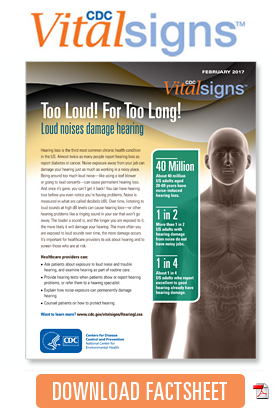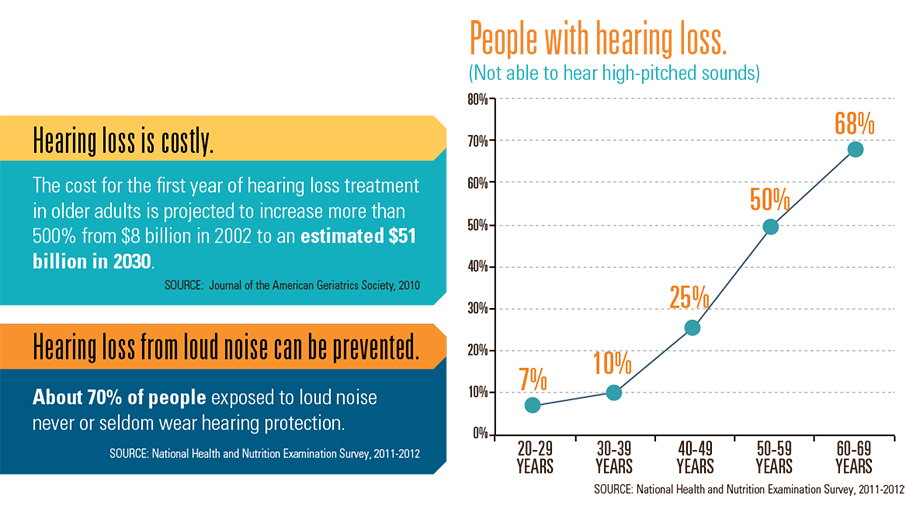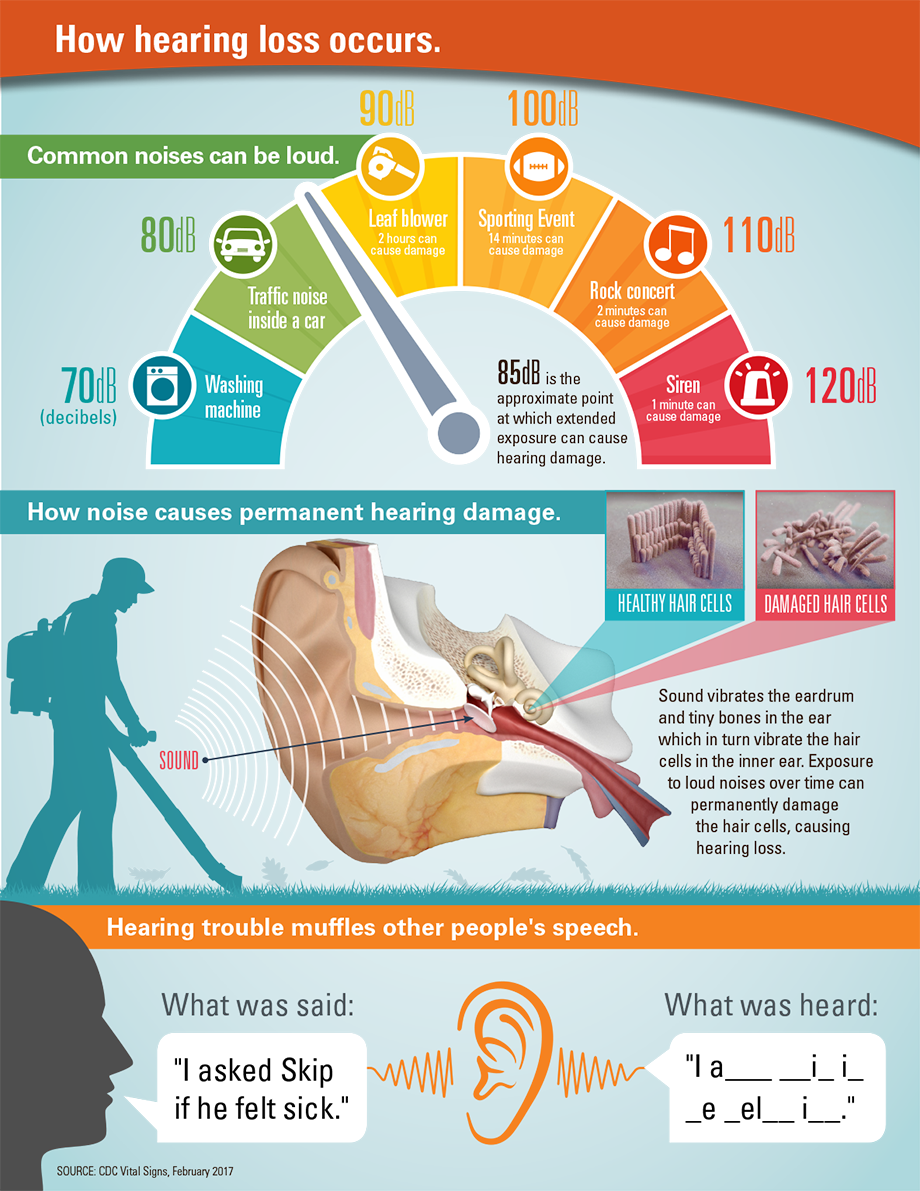Too Loud! For Too Long!
Loud noises damage hearing
Overview
Hearing loss is the third most common chronic health condition in the US. Almost twice as many people report hearing loss as report diabetes or cancer. Noise exposure away from your job can damage your hearing just as much as working in a noisy place. Being around too much loud noise—like using a leaf blower or going to loud concerts—can cause permanent hearing loss. And once it’s gone, you can’t get it back! You can have hearing loss before you even notice you’re having problems. Noise is measured in what are called decibels (dB). Over time, listening to loud sounds at high dB levels can cause hearing loss—or other hearing problems like a ringing sound in your ear that won’t go away. The louder a sound is, and the longer you are exposed to it, the more likely it will damage your hearing. The more often you are exposed to loud sounds over time, the more damage occurs. It’s important for healthcare providers to ask about hearing and to screen those who are at risk.
Healthcare providers can:
- Ask patients about exposure to loud noise and trouble hearing, and examine hearing as part of routine care.
- Provide hearing tests when patients show or report hearing problems, or refer them to a hearing specialist.
- Explain how noise exposure can permanently damage hearing.
- Counsel patients on how to protect hearing.

Problem
Many people are exposed to noise that damages their hearing.
Hearing gets worse over time the more often people are exposed to loud sounds.
- About 53% of people ages 20-69 who have hearing damage from noise report no on-the-job exposure.
- About 24% of people ages 20-69 who report having excellent hearing have measurable hearing damage.
- About 20% of adults with no job exposure to loud sounds have hearing damage.
Hearing loss often gets worse for years before anyone notices or diagnoses it.
- People may not know that activities away from work can damage hearing just as much as noise on the job.
- People delay reporting hearing loss because they don’t know or won’t admit they have a problem.
- Less than half (46%) of adults who reported trouble hearing had seen a healthcare provider for their hearing in the past 5 years.
Hearing loss causes many problems.
- Continual exposure to noise can cause stress, anxiety, depression, high blood pressure, heart disease, and many other health problems.
- Some people are at higher risk for hearing loss, including those who:
- are exposed to loud sounds at home and in the community.
- work in noisy environments (especially noise of 85 dB or more for 8 hours or longer).
- take medicines that increase their risk.
- are male.
- are age 40 or older.
Infographics
What Can Be Done?
The Federal government is
- Monitoring the health of the nation and setting targets for improvement through the Healthy People 2020 hearing objectives.
- Raising public awareness about the health effects of noise-induced hearing loss and how to prevent it.
- Tracking hearing loss and establishing standards to protect hearing in places such as mines, factories, and airports.
- Providing information to healthcare providers about effective counseling on the effects of noise exposure and correct use of hearing protection.
- Supporting research on the extent of hearing loss in America, contributing factors, and the most effective prevention strategies.
Healthcare providers can
- Ask patients about exposure to loud noise and trouble hearing, and examine hearing as part of routine care.
- Provide hearing tests when patients show or report hearing problems, or refer them to a hearing specialist.
- Explain how noise exposure can permanently damage hearing.
- Counsel patients on how to protect hearing.
Everyone can
- Avoid noisy places whenever possible.
- Use earplugs, protective ear muffs, noise canceling headphones when near loud noises.
- Keep the volume down when watching TV, listening to music, and using earbuds or headphones.
- Ask your doctor for a hearing checkup and how to protect your hearing from noise.
Questions healthcare providers can ask patients.
- Do you find it difficult to follow a conversation if there is background noise?
- Can you usually hear and understand what someone says in a normal tone of voice when you can’t see that person’s face?
- Do you feel frustrated with your hearing when talking to family or friends?
- Are you often exposed to loud sounds, either at work or away from work?
Videos
Videos
Issue Details
Issue Details
Related Pages
- Vital Signs Issue details: Loud noises damage hearing, Morbidity and Mortality Weekly Report (MMWR)
- Vital Signs – Too Loud! For Too Long! [PODCAST – 1:15 minutes]
- Vital Signs – Too Loud! For Too Long! [PSA – 0:60 seconds]
- CDC: Environmental Noise Exposure and Health
- CDC: What is Hearing Loss?
- CDC: Environmental Noise Sources
- CDC: Adverse Health Effects from Noise
- CDC: Public Health Burden from Noise and Hearing Loss
- CDC: How do I know if I have hearing loss caused by loud noise?
- CDC: What is I Already Have Hearing Loss?
- CDC: Recommendations and Guidelines
- CDC: Additional Resources
- CDC: Environmental Noise Exposure and Health—References
- CDC: Noise and Hearing Loss Prevention
- CDC: Hearing Loss in Children
Other Sites
- MedlinePlus – Hearing Disorders and Deafness
- MedlinePlus – Noise
- American Academy of Audiology
- American Academy of Family Physicians
- American Academy of Otolaryngology—Head & Neck Surgery
- American Academy of Pediatrics
- American Speech-Language-Hearing Association (ASHA)
- Dangerous Decibels
- Dangerous Decibels Educator Resource Guide
- Directors of Speech and Hearing Programs in State Health and Welfare Agencies (DSHPSHWA)
- Hearing Education and Awareness for Rockers
- Hearing Health Foundation
- Hearing Loss Association of America
- Hyperacusis Research
- Listen for Life: Noise-Induced Hearing Loss Prevention
- National Hearing Conservation Association
- Noise Pollution Clearinghouse
- Sight and Hearing Association
- The Quiet Coalition
Intervention and Family Support Services
Science Behind the Issue
- Page last reviewed: February 7, 2017
- Page last updated: February 7, 2017
- Content source:
Error processing SSI file


 ShareCompartir
ShareCompartir


